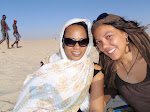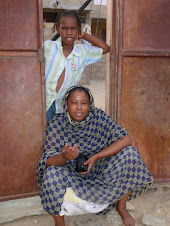I hear the metal door to my compound pull open and I lift my head to the sound of rusty metal scrapping. I am sitting on the floor with papers and grammar books spread around me lesson planning for the following week. This group of lessons I’m trying to figure out the best way to tell my students about irregular present participles, a topic I know will be greeted with blank stares and squinted brows. Pausing, I gaze out the door of my house waiting to see who appears in the frame. I hear her before I see her.
“Ash-e-lee?” She calls, with excitement laced through her tone.
“Fatou! Je suis la – I’m right here.” I tell my friend.
She steps into my view with a huge smile plastered on her face. Opening her arms wide she shouts, “FELICITACIONS! Barack Obama – President United States!”
I laugh and stand up, immediately folded into her waiting arms while each cheek is excitedly kissed. She tells me she has been watching the news all night and that she was so happy for me – and so relieved that Americans “have chosen the right one”. I tell her about my lucky friends who were in Chicago for his acceptance speech and she agrees that they have witnessed a piece of history. We sit for a while chatting about change and hope, how the American presidential elections can touch the hearts of those in an obscure country called Mauritania.
The day after elections electricity pulsed through my veins. I stayed up the night before listening to the radio as the polls rolled in, gazing at the brilliant stars above me and willing the American people to show the world that they can change. I received calls throughout the night, from the U.S.A., from Belize and from Mauritania, all family and friends’ assuring me that the charged pulse I felt was not only pumping in my body. That morning as the cool night turned itself over to the African sun I sat with another volunteer listening to that Chicago speech, my eyes stinging with pride and relief washing over my body. I was humbled to realize that Americans weren’t the only ones who felt these emotions. I continuously greet people in the street who say in happy Hassaniya “Bush mshat! Obama President!” Their eyes are genuine and their handshakes hearty, I tell them “yes, Bush is gone, we are very happy. It is very good.” They are satisfied to know I’m pleased with the change as well and their smiles linger a little longer than usual. At times people only need to see me or my fellow Peace Corps Volunteers walking through the streets to shout “Obama!” and simply leave it at that. I have heard this from small children jumping up and down on rooftops and from small old men resting on the floors of boutiques.
Though, as in the USA, not everyone is pleased with the change. The stories of our past intertwine with so many. Our waters run together and one ripple or splash travels further than we can imagine. Considering the fact that America has its hands dug into the earth of so many nations it’s not surprising to find groups of people that have different views of American politics. Talking with a Pulaar, a black African Mauritanian, one will find a person that loves Bush and are sad to see him go. The reason is that for many years now Bush has supplied weapons to bring down those that called for the Arabization of the Middle East and other Muslim countries. Mauritania has had its own problems with identity and events in 1989 reveal a rather bloody boarder fight with Senegal as the country tried to define itself. Many of the black African’s, especially Pulaars who are a large culture in Senegal, were beaten and humiliated, expelled from their homes and sent across the border. During this time Bush was a friend who helped them – if not through the actual backhand passing of weapons for protection, then through support of their resistance.
Mauritania is still trying to create an identity. With so many groups of people (Pulaars, Sonike’s, Wolofs, Black and White Moors) and being a rather newly independent country (November 28, 1960) things like official language, government, politics and education are constantly debated. I see the backlash of such problems in my school, where Education Reforms call for Sciences to be taught in French and Humanities to be taught in Arabic. Teachers who have always taught in Arabic find their very professions at risk. Some of the best teachers resolve to lie about knowing a language to trick their way into teaching the subjects they know best. Mauritania is still a very fragile country. Still taking baby steps and learning from mistakes as an independent country.
Mauritania’s Independence Day is this Friday. It is a day to be celebrated and, maybe, a day to face many of the questions floating in the air. What does it mean to be Mauritanian? What does it mean to be free? What should be done about the inter-cultural tensions? Perhaps these questions will be considered. Or perhaps they will just dance…
Living in a country that is still trying to figure out Democracy, it is a good feeling to see the message Americans are sending out to the world. An example that Democracy can work, that people should have a voice, and that there are places where those voices are heard. At times it’s unreal to see that new respect and that lingering smile in the eyes of those who watch their own country struggle.




